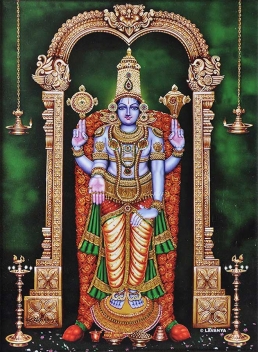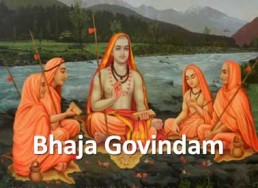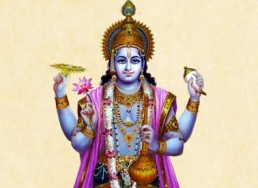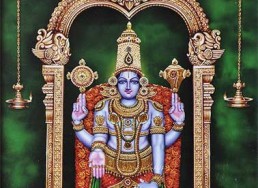Uttishto Uttishta Govinda
उत्तिष्ठ कमलाकांत त्रैलोक्यं मंगलंकुरु ॥
uttiṣṭha kamalākāṃta trailokyaṃ maṃgalaṃkuru ..
- उत्तिष्ठ (uttiṣṭha) – Arise. A call to Lord Viṣṇu, asking him to awaken and act for the well-being of all.
- गोपविन्द (govinda) – O Govinda. Refers to Lord Viṣṇu, the protector of cows and the preserver of the universe.
- गरुडध्वज (garuḍadhvaja) – O one who bears the Garuda emblem. Refers to Lord Viṣṇu, who has Garuda, the mighty eagle, as his vehicle and emblem.
- कमलाकान्त (kamalākāṃta) – O beloved of Lakshmi. Refers to Lord Viṣṇu as the consort of Goddess Lakshmi, the goddess of wealth and prosperity.
- त्रैलोक्यं (trailokyaṃ) – The three worlds. Refers to the three realms: heaven, earth, and the underworld, over which Lord Viṣṇu presides.
- मङ्गलं (maṃgalaṃ) – Auspiciousness. Refers to bringing blessings, peace, and goodness.
- कुरु (kuru) – Make. A request to the Lord to create or bring about auspiciousness.

Description
This is a verse from the Sri Venkateswara Suprabatham. This shloka is a prayer calling upon Lord Vishnu (Govinda) to rise and bring auspiciousness to the three worlds—heaven, earth, and the underworld. By addressing Vishnu with different epithets such as Govinda, Garuḍadhvaja (bearer of the Garuda emblem), and Kamalākānta (beloved of Lakshmi), the verse highlights various aspects of his divine role as the preserver of the universe, protector of wealth and well-being, and the force of righteousness.
For devotees, chanting this verse, especially upon waking in the morning, serves as a reminder, first to the devotee to awaken their own awareness of the divine Lord, and also to invoke Lord Vishnu’s grace for the protection and prosperity of all beings in all three realms. The repetition of Uttiṣṭha (arise) expresses urgency and earnestness, highlighting the devotee’s intense desire for the Lord’s active intervention in bringing peace and auspiciousness to the three worlds. It reflects the recognition of Vishnu as the ultimate source of harmony and well-being for all of creation.
For contemplation
The question might arise: Why is the devotee waking up the Lord? Isn’t the Lord ever-awake, ever-present, omni-potent, Consciousness itself? Then where is the question of sleep and waking up for the Lord?
The “God” being awakened symbolizes the divine presence within us. Just as the deity is “woken up,” this verse reminds the devotee to awaken their own awareness of the divine. It is a call to oneself to recognize God’s presence and become attuned to His guidance and grace. The devotee, in all earnestness wants to engage with Him and feel His divine presence. Then there is also the devotee’s desire for cosmic well-being. In that sense, the act of “waking Him up” symbolizes invoking the Lord’s active presence and intervention in the world. It is a way of asking the Supreme Lord Vishnu to direct His divine energies toward the protection, preservation, or prosperity of the universe.
Trailokyaṃ
There are a few interpretations of the phrase Trailokyaṃ:
Heaven (Svarga): The abode of gods (e.g., Indra’s Svarga).
Earth (Bhūmi): The realm of humans and other beings.
Netherworld (Pātāla): The domain of asuras (demons) and serpents (nāgas).
In a symbolic sense, the three worlds represent different levels of consciousness:
Earth (Bhūmi): The physical plane or waking state (jāgrat), where we engage with the material world.
Heaven (Svarga): The mental or dream state (svapna), representing the realm of thoughts and imagination.
Netherworld (Pātāla): The subconscious or deep sleep state (suṣupti), which lies beneath the surface of awareness.
Together, these point to the transcendence of all dualities in the fourth state (turīya), where the Self (Ātman) is realized as one with Brahman.
From a non-dual Vedantic view, the three worlds can be seen as projections of Māyā (illusion). They represent:
The gross (sthūla), subtle (sūkṣma), and causal (kāraṇa) planes of existence.
Realizing the unity of the Self as Brahman transcends these apparent distinctions, uniting the “three worlds” into one undivided reality.
For a full audio of the Sri Venkateswara Suprabatham, click here to download
Other Govinda Shlokams
Bhaja Govindam
Shlokams,Vishnu,Sankara,Govinda,Krishna,Prakarana Grantha
Bhaja Govindam is one of the most popular hymns penned by Adi Shankaracharya. He has packed into the Bhaja Govindam song the substance of all Vedanta, and set the oneness of Jnana and Bhakti to melodious music.
Govindeti Sada Snanam
Forever shall be bathing with Govinda chant, forever shall be praying with Govinda chant, forever shall be meditating with Govinda chant, forever there shall be Govinda chant.
Kalyana Adbhuta Gatraya
O auspicious Lord Srinivasa, the auspiciously-wonderful-bodied god, the bestower of all desired wishes, the consort of Sri (Lakshmi), the depository of the treasure of auspiciousness, the wealthy trea
Kausalya Supraja
O good offspring of Kausalya, Rama, the yester-evening (and night) is creeping away (into dawn), awake, the greatest of beings, may you perform the daily duties of your godly status.
Mangalam Bhagavan Vishnu
Salutations to you O auspicious ones - Lord Vishnu, Lord Madhusudana, Lord Pundarikaksha, Lord Garudadhwaja.
Namah Kamala Netraya
Salute to you lotus-eyed Lord, the lotus-garlanded Lord, the lotus-navelled Lord, the consort the goddess Lakshmi. (Kamala).
Narayana Kavacham
Shlokams,Vishnu,Govinda,Krishna
The Narayana Kavacham occurs in chapter eight of the sixth skanda of Bhagavada Purana. It is an Armour (Kavach) to protect ourselves from all our enemies (including negativitie
Sriyah Kanthaya Kalyana Nidhaye
O auspicious Lord Srinivasa, the auspiciously-wonderful-bodied god, the bestower of all desired wishes, the consort of Sri (Lakshmi), the depository of the treasure of auspiciousness, the wealthy trea
Venkatesa Suprabhatam
This shlokam is taken from Sri Valmiki's Srimadh Ramayanam. During the journey with Sage Viswamitra, both Rama and Lakshmana had rested for the night on the banks of the Ganga river. As the dawn was
Uttishto Uttishta Govinda – Govinda – In Sanskrit with English Transliteration, Translation and Meaning. Commentary for selected Shlokams.



